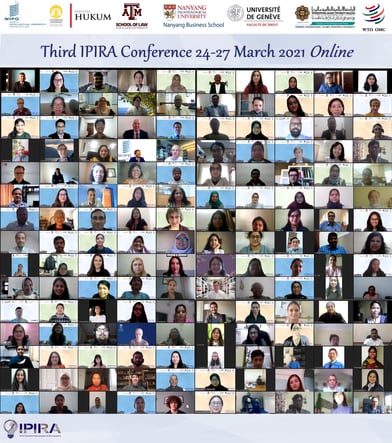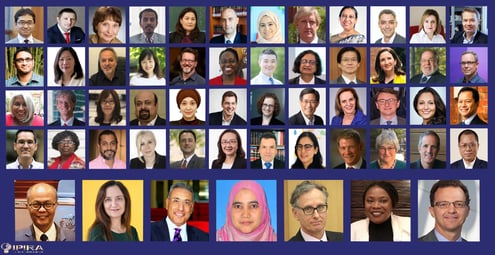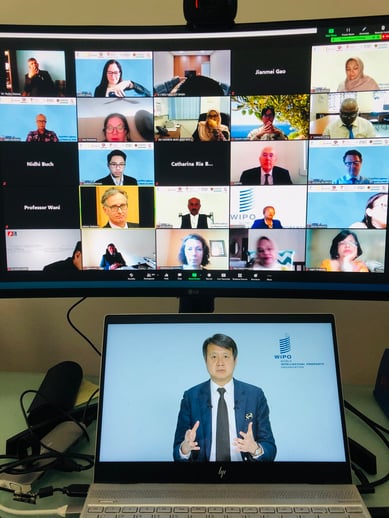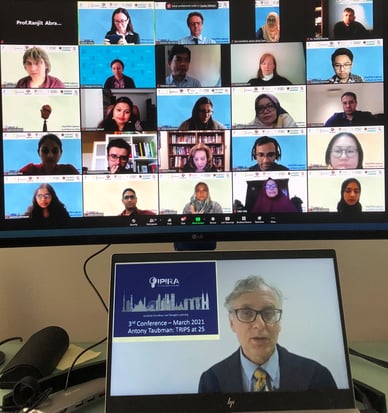On March 24-27, 2021, Professor Irene Calboli co-organized the Third Annual IPIRA Conference. Hosted virtually by the IP & Innovation Research of Asia (IPIRA) Network, the Third IPIRA Conference gathered over 300 presenters, chairs, and participants from Asia-Pacific, North America, Europe, the Middle East, and Africa.
 The IPIRA Conference provides a forum for IP researchers to discuss their papers and works-in-progress with other academics, practitioners, and policy makers. The Third IPIRA Conference was organized by the IPIRA Network as a collaboration with Texas A&M University School of Law, the World Intellectual Property Organization (WIPO) Academy, the World Trade Organization (WTO), and the following academic institutions: the Ahmad Ibrahim Kulliyyah of Laws, International Islamic University Malaysia; the Faculty of Law, Universitas Indonesia; Nanyang Business School, Nanyang Technological University; and the Faculty of Law, University of Geneva.
The IPIRA Conference provides a forum for IP researchers to discuss their papers and works-in-progress with other academics, practitioners, and policy makers. The Third IPIRA Conference was organized by the IPIRA Network as a collaboration with Texas A&M University School of Law, the World Intellectual Property Organization (WIPO) Academy, the World Trade Organization (WTO), and the following academic institutions: the Ahmad Ibrahim Kulliyyah of Laws, International Islamic University Malaysia; the Faculty of Law, Universitas Indonesia; Nanyang Business School, Nanyang Technological University; and the Faculty of Law, University of Geneva.
This year’s conference follows the First IPIRA Conference, organized in early February 2019, and the Second IPIRA Conference held in Indonesia in early February 2020. The IPIRA Conference is also linked to the IP Researchers Europe Conference (IPRE), which was launched in 2018 in Geneva, and which is also co-organized by Calboli.
 The Organizers of the Third IPIRA Conference were assisted by a group of distinguished academics serving as Scientific Committee and by several research centers and universities in Asia-Pacific, Europe, Africa, and the Americas acting as Supporting Institutions.
The Organizers of the Third IPIRA Conference were assisted by a group of distinguished academics serving as Scientific Committee and by several research centers and universities in Asia-Pacific, Europe, Africa, and the Americas acting as Supporting Institutions.

Students and recent graduates from Texas A&M School of Law and partner universities also assisted the Organizers to carry on the details and technical logistics of the Conference.
WIPO Director General Daren Tang delivered a Key Note Address at the opening of the Conference, in which he stressed the role of academics as active participants in policy making at the national and international level. He additionally highlighted the growing importance of countries in Asia as global innovation leaders and praised the opportunity to hear from several academics and researchers from the region.
 This year’s Conference featured several parallel sessions, in which senior and junior professors, research fellows, and Ph.D. candidates presented their works-in-progress to other presenters. Presentations focused on a variety of topics, including Geographical Indications of Origin, Artificial Intelligence and New Technologies, IP and Fundamental Rights, IP and Technology Management, Trademarks, Enforcement and Dispute Resolution, IP and Health, and Plant Varieties, Patents, and Biodiversity. The various parallel sessions were attended by other presenters and attendees who provided valuable comments and feedback.
This year’s Conference featured several parallel sessions, in which senior and junior professors, research fellows, and Ph.D. candidates presented their works-in-progress to other presenters. Presentations focused on a variety of topics, including Geographical Indications of Origin, Artificial Intelligence and New Technologies, IP and Fundamental Rights, IP and Technology Management, Trademarks, Enforcement and Dispute Resolution, IP and Health, and Plant Varieties, Patents, and Biodiversity. The various parallel sessions were attended by other presenters and attendees who provided valuable comments and feedback.
The Conference also featured two plenary sessions. The First Plenary focused on “Intellectual Property and Innovation During and After Covid-19” and featured speakers from WIPO, WTO, the ASEAN Secretariat and academia. The Second Plenary focused on “The Impact of IP Teaching and Researching on Public Policy” and featured speakers from WIPO, WTO and academia. Mr. Tony Taubman, the Director of the IP Division of the WTO, delivered a closing lecture on “TRIPS @ 25”.
 “The Third IPIRA Conference was again a very successful event!” said Professor Calboli. “Although the Conference was held online due to the Covid-19 pandemic, we are so grateful that so many colleagues were able to be a part of the Conference.”
“The Third IPIRA Conference was again a very successful event!” said Professor Calboli. “Although the Conference was held online due to the Covid-19 pandemic, we are so grateful that so many colleagues were able to be a part of the Conference.”
Participants once again acknowledged the work of Calboli, whose engagement in Asia has brought about important opportunities for scholars in the region. Calboli founded the IPIRA Network in 2018 and the Network has today 700 members from academic institutions across the world. In addition, she founded the IPScholars Asia (IPSA) Conference and organized its 2016, 2017 and 2018 editions at Singapore Management University. The IPSA Conference was renamed “Asian IP Works in Progress Conference” and held its fifth edition in 2020 at City University of Hong Kong.
The Intellectual Property law program at Texas A&M University School of Law continues to be a strong international hub for research and education thanks to the work of its world-renowned faculty. In addition to an intellectual property concentration for J.D. students, the program offers a Master of Laws (LL.M.) in Intellectual Property degree for lawyers and a Master of Jurisprudence (M.Jur.) in Intellectual Property degree for non-lawyers. In the past several years, Texas A&M University School of Law’s Intellectual Property program is ranked as one of the best in the United States. In 2021, it was ranked as number seven, up one position from the previous year.
For additional news on this year’s IPIRA Conference, please visit:
- WIPO DG Daren Tang Gives a Keynote Address to IPIRA Conference
- Third IP & Innovation Researchers of Asia (IPIRA) Conference online (March 24 – March 27, 2021) (unige.ch)
- [Guest post] Conference Report: The Third IP & Innovation Researchers of Asia - The IPKat (ipkitten.blogspot.com)
- https://www.thedailystar.net/law-our-rights/news/3rd-ip-innovation-researchers-asia-ipira-conference-2070189
- Intellectual Property and Innovation Researchers of Asia (IPIRA) Conference on March 24, 2021 (iium.edu.my)
- https://www.asiaiplaw.com/section/news-analysis/3rd-ip-innovation-researchers-of-asia-ipira-conference-on-march-24-27-2021